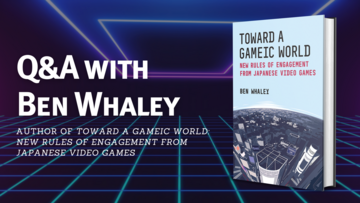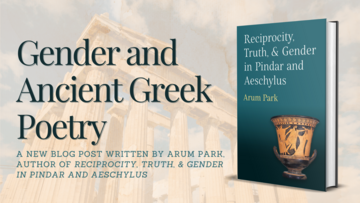Celebrate Asian American and Pacific Islander Heritage Month with UMP!

May is Asian American and Pacific Islander Heritage Month, which is a celebration and acknowledgement of the cultural and historical impacts of these important groups and their members. AAPI month was first recognized in the US in 1978, and since then has become a time to honor Asian Americans and Pacific Islanders. You can learn more about it here, and for those lucky enough to be in Ann Arbor, you can attend some AAPI month events. From Japanese video games to the ecology of the Pacific, the University of Michigan Press is highlighting some of our most relevant titles.
During the month of May, you can save 50% on any book when you shop our website and use promo code SPRING23!
Made-Up Asians: Yellowface During the Exclusion Era by Esther Kim Lee
This book traces the history of yellowface, the theatrical convention of non-Asian actors putting on makeup and costume to look East Asian. Using specific case studies from European and U. S. theater, race science, and early film, Esther Kim Lee traces the development of yellowface in the U. S. context during the Exclusion Era (1862–1940), when Asians faced legal and cultural exclusion from immigration and citizenship. These caricatured, distorted, and misrepresented versions of Asians took the place of excluded Asians on theatrical stages and cinema screens. Made-Up Asians also shows how lingering effects of Asian exclusionary laws can still be seen in yellowface performances, casting practices, and anti-Asian violence into the 21st century.
Moving Islands: Contemporary Performance and the Global Pacific by Diana Looser
Finalist: Association for Theatre in Higher Education (ATHE) 2022 Outstanding Book Award
Finalist: American Society for Theatre Research (ASTR) 2022 Barnard Hewitt Book Prize
Moving Islands reveals the international and intercultural connections within contemporary performance from Oceania, focusing on theater, performance art, art installations, dance, film, and activist performance in sites throughout Oceania and in Australia, Asia, North America, and Europe. Diana Looser’s study moves beyond a predictable country-specific or island-specific focus to encompass an entire region defined by diversity and global exchange, showing how performance operates to frame social, artistic, and political relationships across widely dispersed locations. The study also demonstrates how Oceanian performance contributes to international debates about diaspora, indigeneity, urbanization, and environmental sustainability. The author considers the region’s unique cultural and geographic dynamics as she brings forth the paradigm of transpasifika to suggest a way of understanding these intercultural exchanges and connections, with the aim to “rework the cartographic and disciplinary priorities of transpacific studies to privilege the activities of Islander peoples.”
Empire and Environment: Ecological Ruin in the Transpacific by Jeffrey Santa Ana, Heidi Amin-Hong, Rina Garcia Chua, Zhou Xiaojing, Editors
Empire and Environment argues that histories of imperialism, colonialism, militarism, and global capitalism are integral to understanding environmental violence in the transpacific region. The collection draws its rationale from the imbrication of imperialism and global environmental crisis, but its inspiration from the ecological work of activists, artists, and intellectuals across the transpacific region. Taking a postcolonial, ecocritical approach to confronting ecological ruin in an age of ecological crises and environmental catastrophes on a global scale, the collection demonstrates how Asian North American, Asian diasporic, and Indigenous Pacific Island cultural expressions critique a de-historicized sense of place, attachment, and belonging. In addition to its thirteen chapters from scholars who span the Pacific, each part of this volume begins with a poem by Craig Santos Perez. The volume also features a foreword by Macarena Gómez-Barris and an afterword by Priscilla Wald.
Minor Salvage: The Korean War and Korean American Life Writings by Stephen Hong Sohn
The Korean War, often invoked in American culture as “the forgotten war,” remains ongoing. Though active fighting only occurred between 1950 and 1953, the signing of an armistice resulted in an infamous stalemate and the construction of the Korean Peninsula’s Demilitarized Zone. Minor Salvage reads early Korean American life writings in order to explore the admittedly partial ways in which those made precarious by war seek to rebuild their lives. The titular phrase “minor salvage,” draws on different valences of the word salvage which, while initially associated with naval recovery efforts, can also be used to describe the rescue of waste material. Spurred by the stories told and retold to him by his parents Soon Ho and Yunpyo, Sohn enacts minor salvage by reading overlooked early Korean American life writings penned by Induk Pahk, Taiwon Koh, Joseph Anthony, and Kim Yong-ik alongside a later generation of life writings authored by Sunny Che and K. Connie Kang. In the context of the Korean War, Sohn argues, life writings take on a crucial political orientation precisely because of the fragility attached to refugees, civilians, children, women, and divided family members. To depict the possibility of life is to acknowledge simultaneously the threat of death, violence, and brutality, and in this regard, such life writings are part of a longer genealogy in which marginalized communities find representational power through the creative process.
Cosmopolitan Love: Utopian Vision in D. H. Lawrence and Eileen Chang by Sijia Yao
Love, and the different manifestations of it, is a common theme in literature around the world. In Cosmopolitan Love, Sijia Yao examines the writings of D. H. Lawrence, a British writer whose literature focused primarily on interpersonal relationships in domestic settings, and Eileen Chang, a Chinese writer who migrated to the United States and explored Chinese heterosexual love in her writing. While comparing the writings of a Chinese writer and an English one, Yao avoids a direct comparison between East and West that could further enforce binaries. Instead, she uses the comparison to develop an idea of cosmopolitanism that shows how the writers are in conversation with their own culture and with each other. Both D. H. Lawrence and Eileen Chang wrote stories that are influenced by—but sometimes stand in opposition to—their own cultures. They offer alternative understandings of societies dealing with modernism and cultural globalization. Their stories deal with emotional pain caused by the restrictions of local politics and economics and address common themes of incestuous love, sexual love, adulterous love, and utopian love. By analyzing their writing, Yao demonstrates that the concept of love as a social and political force can cross cultural boundaries and traditions to become a basis for human meaning, the key to a cosmopolitan vision.
This post was written by Emilia Ferrante, a new graduate from the University of Michigan with a BA in Honors English and Anthropology. In addition to being a UM Press intern, she was also the Editor-in-Chief of the Residential College’s literary magazine and has held several editorship positions in the Arts section of the Michigan Daily. In the fall, she will start studies at SciencesPo in Paris for her Master's degree in creative industries.








